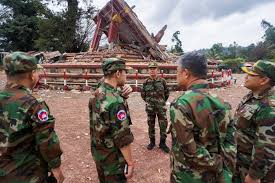
Calls Grow for Thailand to Release 20 Cambodian Soldiers Detained After Border Clashes

 :
| Updated On: 31-Jul-2025 @ 12:08 pm
:
| Updated On: 31-Jul-2025 @ 12:08 pmSHARE
Cambodia Urges Return of Soldiers Amid Tensions with Thailand Following Ceasefire
Cambodia has formally called on Thailand to return 20 of its soldiers who were captured by Thai forces shortly after a ceasefire was implemented to end several days of deadly cross-border clashes. These confrontations occurred over a disputed stretch of territory between the two Southeast Asian neighbors, causing significant casualties and displacement on both sides.
The ceasefire had come into effect between Cambodia and Thailand following intense fighting involving long-range rockets, artillery, and even airstrikes by Thai fighter jets. The affected region, largely composed of jungle and farmland, witnessed the displacement of nearly 300,000 civilians as both armies clashed heavily. The violence resulted in the deaths of at least 15 Thai soldiers and 15 civilians, while Cambodia reported the deaths of eight civilians and five soldiers.
Despite the ceasefire being in effect, reports suggest that a group of Cambodian troops crossed into Thai-held territory around 7:50 a.m. local time on Tuesday—nearly eight hours after the ceasefire had taken hold—and were subsequently taken into custody by Thai forces.
Maly Socheata, spokesperson for Cambodia's Ministry of National Defence, announced during a press briefing that negotiations were ongoing for the release of the 20 soldiers. She stressed the government’s intent to bring back the detained troops safely and promptly. Socheata also directly appealed to the Thai government to release the soldiers without delay.
In response, Thai army spokesperson Major-General Winthai Suvaree stated that the Cambodian detainees—officially numbered as 18 by Thai sources—would be treated according to international legal standards. He confirmed that the commander of Thailand’s Second Army Region had assured due legal process for the Cambodian soldiers. Once the legal proceedings were complete, the soldiers would be returned to Cambodia. However, the exact legal charges or proceedings the Cambodian troops might face were not immediately specified.
Thailand’s government emphasized that the captured soldiers were being treated under the guidelines of international humanitarian law and military protocols. The Thai authorities also stated that repatriation would occur once the border situation stabilized.
The broader conflict and subsequent ceasefire have drawn international attention. United Nations human rights chief Volker Turk praised the ceasefire and urged both nations to fully honor the agreement in good faith. He emphasized the need for Cambodia and Thailand to work together through diplomacy to build mutual trust and address the underlying causes of the conflict.
The ceasefire, brokered with help from Malaysia, has remained intact since Tuesday despite mutual allegations of its violation by both sides. The ongoing diplomatic talks and calls from international organizations highlight the need for a peaceful and lasting resolution to prevent future outbreaks of violence in the region.
The incident also underscores the fragile nature of border relationships in Southeast Asia, particularly when disputed territories and national pride are involved. Both governments now face the dual challenge of maintaining internal political stability while navigating complex diplomatic terrain with their neighbor.